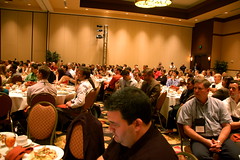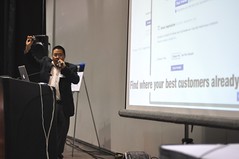
The third expansion pack to the World of Warcraft franchise, Cataclysm, will be coming out this year. Everything that players have known and loved for the last 5 years is on the table for a re-write, from how characters work to the virtual places and hangouts where players have spent their time for half a decade. It’s Blizzard Entertainment’s way of rebooting the franchise, changing up how it will work, and theoretically giving them room to continue growing the franchise.
From a story perspective, the virtual world of Azeroth is going to be struck by a massive disaster that will shatter it, completely changing things and causing a lot of mayhem. Here’s what’s different about this disaster: we all know it’s coming some time this year.
Some people are preparing by gathering up materials in game to sell later, anticipating shortages. Other people are touring the world of Azeroth as it is now, taking pictures and recording their favorite spots, many of which will no longer be available or will be changed beyond recognition. Some are running through dungeons and other parts of the game they’ve missed or never gotten to in five years of playing. Some are trying to maximize their characters’ gear and abilities so that they’re ready to experience all the new parts of the game the moment it hits the shelves.
So here’s the food for thought part: if you knew with 100% certainty that a major disaster was going to befall this world, the real life world, in the next 5 months (but probably before November), and that you’d survive and have access to the basics like food and water, what would you do now to prepare? If you knew that everything from favorite restaurants to the mountains and seas themselves would be different somehow, what would you do differently today to get ready?
Unlike World of Warcraft, we don’t get the luxury of a grand creator notifying us in advance of a major disaster (or allowing us to beta test life in it).
Now that you’ve got an idea of where you’d go and what you’d do, how much of that is stuff you could do today?
Did you enjoy this blog post? If so, please subscribe right now!
Get this and other great articles from the source at www.ChristopherSPenn.com! Want to take your conference or event to the next level? Book me to speak and get the same quality information on stage as you do on this blog.



 … until the first thing out of their mouth at the proposal stage is a price objection. “It’s too expensive” or a variant of that phrase. Rather than cutting your prices immediately (which is the most common tactic for a rookie salesperson), get specific.
… until the first thing out of their mouth at the proposal stage is a price objection. “It’s too expensive” or a variant of that phrase. Rather than cutting your prices immediately (which is the most common tactic for a rookie salesperson), get specific. I read with great interest about another company forsaking email marketing – this time, ice cream maker Ben & Jerry’s. Good. Thank you very much!
I read with great interest about another company forsaking email marketing – this time, ice cream maker Ben & Jerry’s. Good. Thank you very much! I’ve been shopping around the past few days for a terrific lead automation system for the day job, looking at all of the different vendors out there. One thread that’s been common among all of the comparison discussions on LinkedIn, on blogs, etc. that baffles me is this argument:
I’ve been shopping around the past few days for a terrific lead automation system for the day job, looking at all of the different vendors out there. One thread that’s been common among all of the comparison discussions on LinkedIn, on blogs, etc. that baffles me is this argument: I’ll be doing a webinar on July 23 at 2 PM Eastern on 21st century email marketing, put on by my employer,
I’ll be doing a webinar on July 23 at 2 PM Eastern on 21st century email marketing, put on by my employer,  One of my favorite learning and teaching metaphors comes by way of both the martial arts and
One of my favorite learning and teaching metaphors comes by way of both the martial arts and 


 As a marketer, half of our job is analytical – figuring out what works and optimizing our methods for better results.
As a marketer, half of our job is analytical – figuring out what works and optimizing our methods for better results.